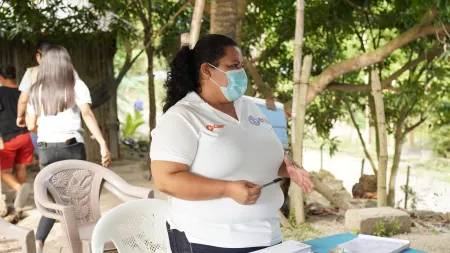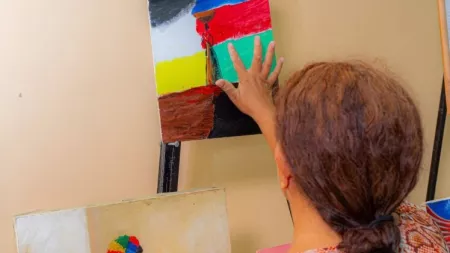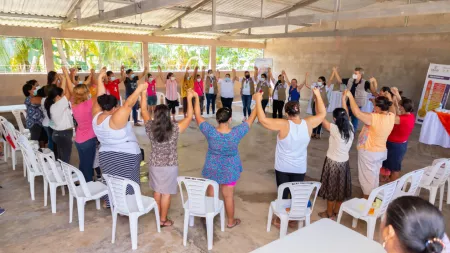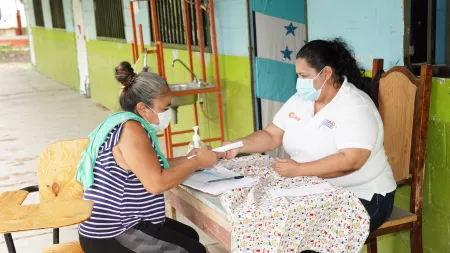Even as women are disproportionately impacted by crises, they continue to be central in leading efforts for sustainable solutions to their compounding effects. In the lead up to World Humanitarian Day on August 19th, we are shining light on the role of women in humanitarian crises around the globe.
Through their work at CARE, our partner organisations, and communities around the world, womanitarians are empowering women everywhere and amplifying their voices in the fight for a world of hope, inclusion, and social justice.
Join us in learning about Erika's amazing journey!
Erika Murillo: “Being a humanitarian worker means being ‘an opportunity’”
In Honduras, one woman is killed every 22 hours. Official reports on domestic violence mount up to 20 thousand every year in a country of only 10 million people. After witnessing firsthand the disproportional impacts of crises on women and girls, especially on their safety, Erika Murillo decided to dedicate her life to help improving gender equality. At CARE, she supports survivors of gender-based violence (GBV) to find safe shelter, access healthcare and engage in livelihood opportunities. Erika also helps to disseminate critical thinking on GBV by acting as a Professor of Gender and Research at Universidad Nacional Autónoma de Honduras. She shared with us how ‘opportunity’ is the keyword in her efforts – for her and the women she supports.

How did you get into humanitarian work?
My first contact with humanitarian work was still in my teenage years when I volunteered at a religious institution in Northern Honduras. However, dedicating my life to this sector was somewhat the work of fate.
I was studying Business and Administration when I found an internship in an NGO’s Finance department. A few months into the work, it became clear that I was always happier when I was around people in the communities we worked with rather than crunching numbers. This was a life-changing realization. I switched my major to Sociology and have since then dedicated my career to helping save lives and support all people to have access to the same opportunities.
What are some of the challenges you face as a woman fighting gender-based violence?
Any woman living and working in a patriarchal society faces challenges. Working to support other women to escape these harmful patterns brings a whole additional set of complexities. We go from directly facing perpetrators of gender-based violence to challenging the state structures that are insufficient in guaranteeing the protection and well-being of women and girls. This brings many layers of security risks and a high emotional toll. However, we are committed to making all people we work with as passionate about gender equality as we are.
What are the rewards in working in this sector?
The main reward is the ability to support survivors to reshape their lives. To rebuild their futures. It often starts with the small great feature of helping women rediscover they can laugh. With the right support survivors of gender-based violence, are able to leave their aggressor's house, find new sources of livelihood and build their own paths. These transformations save lives.
To any humanitarian worker, any life we can help save is the biggest reward.

Are there any specific moments in your career which you’re proud of?
Looking back at my career and the challenges I have faced – floodings, threats of armed groups, being caught up in the crossfire to name a few – I have asked myself: why am I still here? The answer is ‘People’. I want to continue being a means of opportunity for people to access all of their rights and reach their full potential. Every time I am ‘an opportunity’, I am proud of my work.
Thinking about the communities you work with, is there a particular person that you will always remember?
I will never forget María, a community leader we have worked with in La Lima, city in the Northwest of Honduras. She is one of the jolliest and most committed humanitarian workers I have ever met, dedicating her life to supporting women survivors of gender-based violence. Behind her smile and hard work, we had no idea she was actually a survivor of gender-based violence herself. She is an example of everything we work for. An example of how women break stories of violence, suffering, and find rays of light to support other women.
What does being a humanitarian worker mean to you?
It means being an opportunity. Many people think humanitarian workers had completely different lives from the people we work with but often we have shared similar experiences. The only difference is that we had the opportunity to access all of our rights - whether it was at school, our families, at church or any other moment in our lives. Therefore, being a humanitarian worker to me is being the opportunity people may not have had.

Finally, what would you like to see for women and girls in Honduras, particularly those affected by humanitarian crises?
I would like to see empowered women and girls. Women and girls who understand and accept their stories but that also know that negative experiences they may have suffered are simply that, experiences. Undoubtedly difficult events but that do not define them as people.
I want women and girls to see themselves as deserving of their rights. And embrace them. And raise their voices to claim these rights in all spaces they occupy – at home, at school, at work.
It will be a long way to fully reconstructing centuries of negative patriarchal patterns that affect women. However, I am positive that women with stronger internal fortresses will be able to better face better any challenge that society may pose on and more support from communities.
